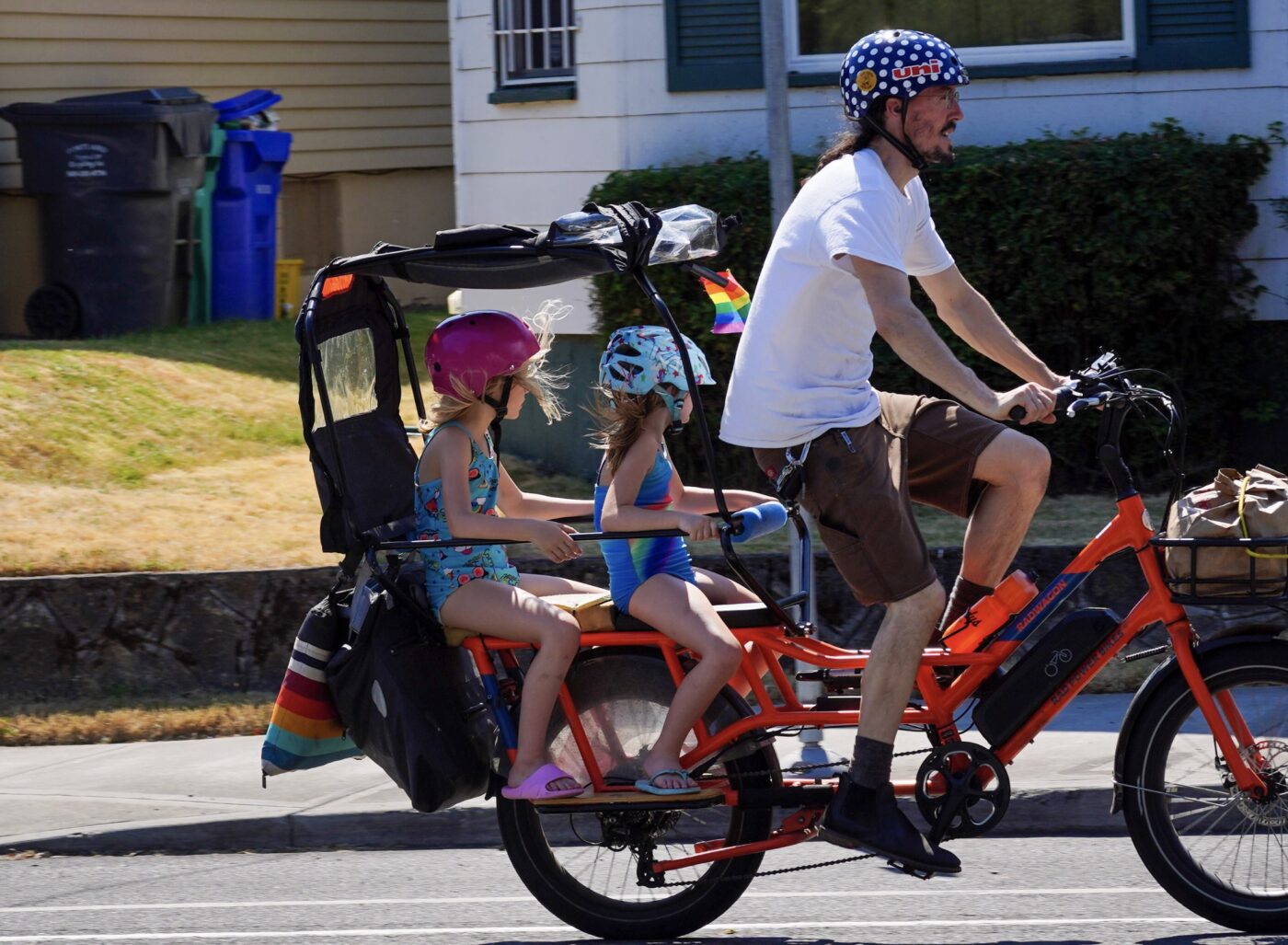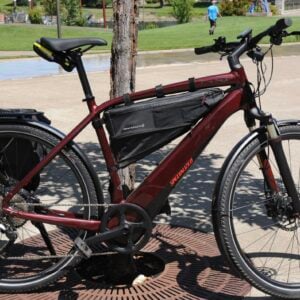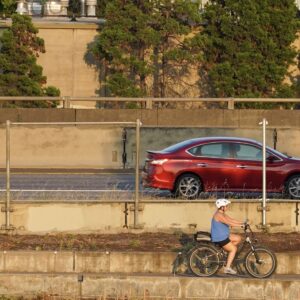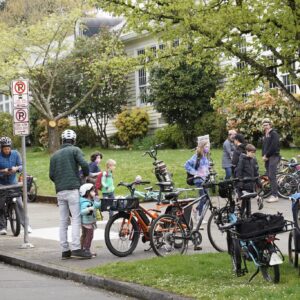A controversial bill that seeks to ban Class 3 electric bikes from bike lanes and bike paths isn’t the only e-bike bill filed by Oregon lawmakers in the new legislative session.
House Representative Mark Gamba, a Democrat from Milwaukie, is sponsoring a bill that would provide eligible Oregonians a rebate of $1,200 on the purchase of an electric bike and related equipment. House Bill 2963 is similar to a bill proposed in 2023, but there are key differences a few more co-sponsors.
HB 2963 would establish an Electric Bicycle Incentive Fund with $6 million in seed money from the General Fund. The voucher program would also be administered via a rule created by the Environmental Quality Commission (the policy arm of the Deparment of Environmental Quality, DEQ). Those elements are the same as the bill proposed in 2023.
What’s new this time around is the bill no longer has two tiers of eligibility. When the 2023 bill, HB 2571, first came out, it had no provision for lower-income people. After a major rewrite to curry more support, its sponsors decided to give people making 80% of median family income the full rebate of $1,200. Folks with higher incomes would be eligible for a smaller $400 rebate.
In HB 2963, they’re taking a new approach. Gone are the income requirements, and now the rebates will be available only for people who receive State of Oregon “medical assistance” (or who have received it in the previous 12 months) as defined in ORS 414.025 (17)(18). The rebate system will be coordinated with the Department of Human Services and Oregon Health Authority. Instead of requiring voucher recipients and bicycle retail shop employees to manage the rebate process themselves, this bill seeks to use the existing Oregon Eligibility System (ONE), which is already used by one in three Oregonians to access government programs like food assistance and medical benefits.
I haven’t spoken to Gamba or other architects of this bill, but I’ll assume this change was made to build political support for the rebate idea and to streamline its implementation.
With each voucher valued at $1,200, HB 2963 would fund 5,000 new bikes if it received $6 million (compared to 10,000 new bikes in the 2023 bill).
Co-sponsors of the bill include Reps Tom Andersen (D-Salem), Willy Chotzen (D-Portland), Travis Nelson (D-Portland), Hai Pham (D-Hillsboro/Beaverton), and Jules Walters (D-Tualatin/Wilsonville). On the Senate side, the bill is co-sponsored by Senators Chris Gorsek (D-Gresham) and Khanh Pham (D-Portland).
Portland has a rebate program of its own that’s slated to begin this summer. That program, funded with $20 million from the City of Portland’s Clean Energy Fund (a tax on retail sales of large corporations) is expected to fund 6,000 bikes over five years. If the Oregon Legislature passes a statewide rebate, Portlanders who qualify for both would be able to stack the benefits on top of each other.
In 2023, HB 2571 passed out of a House committee by a 9-1 margin with bipartisan support but ultimately died in the Ways & Means Committee (where all bills with fiscal impacts must go), despite a push from advocates. Time will tell if the changes in HB 2963 will get it across the finish line.
This new bill has two big things going in its favor: this session lawmakers could pass a multi-billion dollar transportation package so there will be a lot of money flowing around for stuff like this. And its chief sponsor Rep. Gamba is not only an e-bike rider himself, he’s a new member of the Joint Committee on Transportation, which gives him more sway than last time around (and bills that go through the JCT can have a quicker path through the legislative process).
E-bike rebates are a proven policy that have worked in many other states in recent years. With over half of all trips in Portland being less than three miles and research that shows even a small shift of trips from cars to e-bikes would reduce Portland’s transportation emissions by 12%, the environmental benefits are clear. And given the high cost of driving and other negative externalities created by cars, Oregon stands to reap many benefits by making e-bikes more accessible to more people.
If the bill passes it would go into effect in October of this year. Learn more about HB 2963 at the Oregon Legislative Information System.








Thanks for reading.
BikePortland has served this community with independent community journalism since 2005. We rely on subscriptions from readers like you to survive. Your financial support is vital in keeping this valuable resource alive and well.
Please subscribe today to strengthen and expand our work.
MFS has a similar offering that has been in place for a few years now. Check them out at : waystowork@mfs.email
Yes, It’s a great program!
Here’s a paper about the efficacy of e-bike rebate programs in three California communities:
https://www.sciencedirect.com/science/article/pii/S0967070X23001725
Based on my reading of the paper, it doesn’t feel like a slam dunk that they significantly move the needle in mode share and greenhouse gas reduction outside of the first few months after purchase. And I’m still a little salty at the idea that (fully) human-powered bikes are taxed rather than incentivized. But does seem like e-bike rebates are a net positive.
There are lots of little nuggets info in paper (Too many to list here). But I thought that it was interesting that the Dutch report to feeling less safe on cycle paths when there’s a large mode share of e-bikes.
Interesting paper. It reported the annual abatement cost of $4341.43 / ton CO2, which, for those of you without a reference, is extraordinarily costly. For comparison, building a wind turbine costs in the neighborhood of $25 / ton CO2, and direct air capture currently costs in the neighborhood $600-$1,000 per ton (and will certainly fall in the future).
The rebates studied in this program are not an effective way to reduce CO2 emissions.
PS Another interesting thing was the biggest problems people reported with their e-bikes was theft and vandalism, and second was weather. We all know real cyclists don’t care about the weather, but apparently everyone else does.
Yep – but we need to start somewhere. I support any reasonable efforts to move the needle – and this is one.
If CO2 reduction is the goal, which was the case for these studies, then we could move the needle 4-7x further by spending on direct carbon capture, or 173x further by investing in another windmill.
If you believe we are facing a climate crisis, invest the money elsewhere.
Thanks for adding context to those numbers.
It would be interesting to know similar numbers (unit price of CO2 reduction) for building the safe infrastructure needed to keep the “interested but concerned” crowd out of their cars.
None of this is to say that CO2 emission reduction is the only goal of getting people on bike and e-bikes. The other benefits of doing so may be worth the cost.
I’m going to go out on a limb here and say such numbers do not exist, and if they did, they’d be based on so many arbitrary assumptions that they would cease to be meaningful.
If you want to reduce CO2 from driving, the most important step is electrification. Some people claim that the “interested but concerned” crowd, if they really exist at all, will only start riding once there is a completely separated network of bike lanes, which isn’t going to happen in your lifetime or mine, and certainly not in a time frame that is meaningful for reducing the worst ravages of climate change.
The one thing I am certain of is that Portland has built a lot of safe infrastructure over the past decade, and folks are riding less. That significantly undermines claims that the problem is insufficient infrastructure.
Should we be advocating for people to have $1,200 ebikes? Is a $1,200 ebike worse quality or better than a $750 regular bike? Should we be advocating for people who need medical care subsidy to buy a better $3k ebike with a $1,200 rebate resulting in a $1,800 out of pocket cost minimum (still need helmet, lock, etc)? If we’re using public dollars to subsidize medical care and the ebike, would the health outcomes improve to an extent the program pays for itself if the participants were riding a regular bike? If there is also an environmental benefit, is that benefit more or less if we help more people get on regular bikes for the short trips noted than ebikes? If we’re very worried about the emissions from cars and are looking to get people out of them, why wouldn’t we provide a rebate for people to buy 50cc scooters (Honda Metropolitan is $2,500, in line with mediocre ebikes), which get about 100mpg.
What we need is a rebate for emitting less, and let people figure out how to do that in a way that’s most effective for them, rather than trying to prescribe specific solutions that may or may not work well for individual people.
$1200 is indeed low for a quality e-bike and an appropriate lock.
But also what’s the state of bicycle parking at modest apartment buildings?
Portland Ubanists:
We support e-bike subsidies (because decarbonization) but we also support eliminating bike parking regulations (because profits!).
But we don’t much like electric cars (despite decarbonization), because… cars.
And meanwhile 2024 had the largest yearly increase in CO2 emissions on record.
“Should we be advocating for people to have $1,200 ebikes?”
This.
Plus, if you need $750 to buy a manual bicycle, you’re still overspending.
There is a crap metric ton of fully functional used bikes out there for $100 or less.
And if you’re not handy, getting such a bike safe and rideable would still cost far less.
The love of shiny new things in this econo-culture is regularly such a head-scratcher for me.
It would be great if the eligibility were expanded to include veterans with disabilities who are on VA medical and not on state programs.
The bloat begins. How about covering everyone making $1 more than me?
So this is basically yet another tax for employed individuals?
Let’s give $1,200 to a group of people that will turn and sell bike for money.
Not all, but I am sure a good number.
How many bikes are going to be cared for if something goes wrong.
Just like when air conditioners were handed out many went up for sale on Offer Up/NextDoor and Marketplace.
$1,200 is a lot for a bike. I work hard for my money and can’t quite justify $1,200-$3,000 for a e-bike yet I would like one to ride to store for a few groceries or run errands, rather than driving my car. Having an e-bate may just make it possible to purchase.
Maybe this is better for all residents to be included using tiered income system. Quit with all the restrictions and have someone show their ytd pay stub.